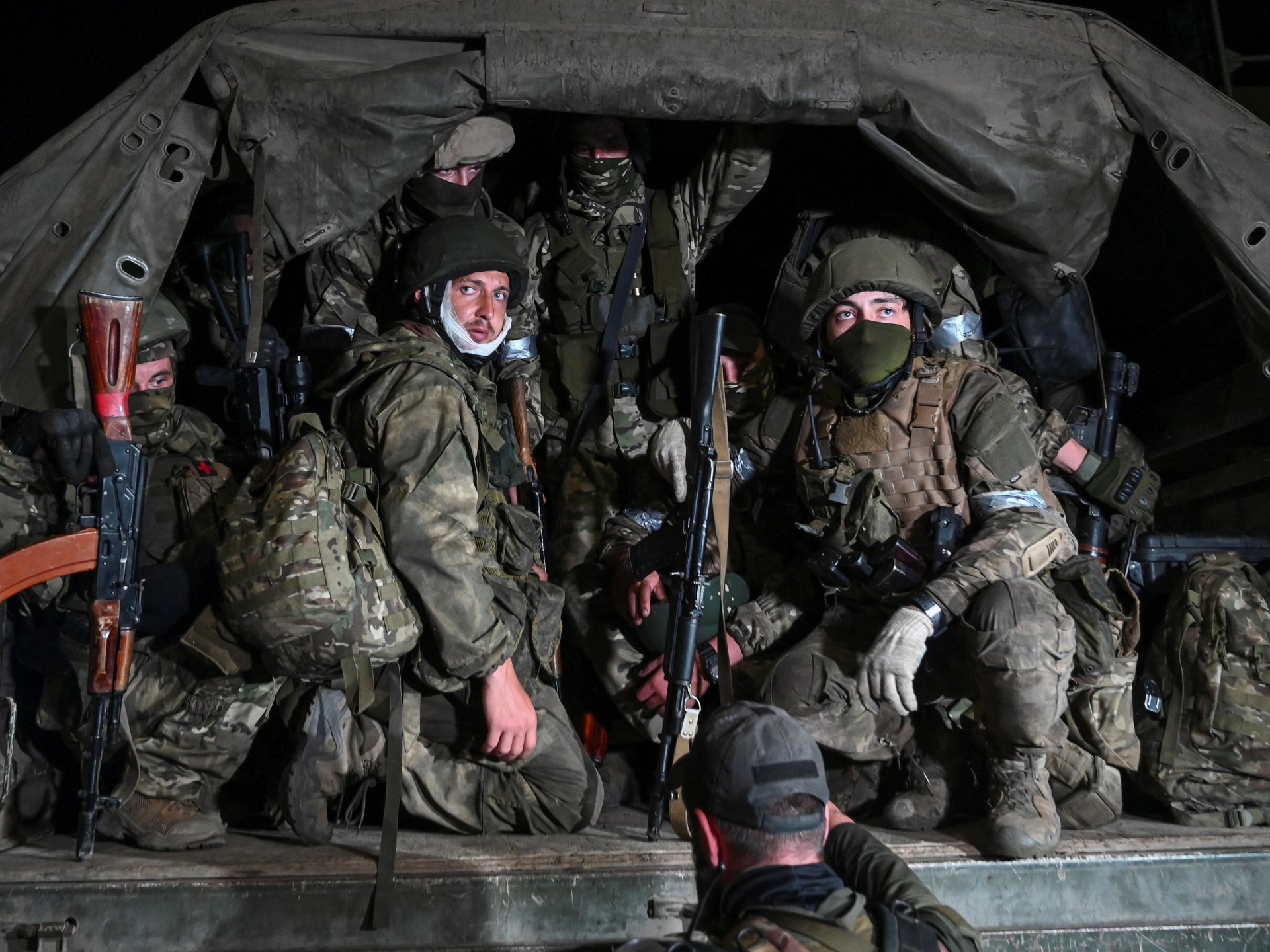Russia-Ukraine war: Nato ‘doing literally nothing’ to stop Russia, says Kyiv – live | Ukraine
Nato ‘doing literally nothing’ to stop Russia, says Ukraine
Ukraine’s foreign minister, Dmytro Kuleba, accused Nato of “doing literally nothing” in the face of Russia’s invasion of his country.
Kuleba praised the EU for its “revolutionary” decisions to back Kyiv but said the Nato military alliance had been “completely sidelined”.
Speaking at the World Economic Forum in Davos, Kuleba said:
Nato as an alliance, as an institution, is completely sidelined and doing literally nothing. I’m sorry to say it.
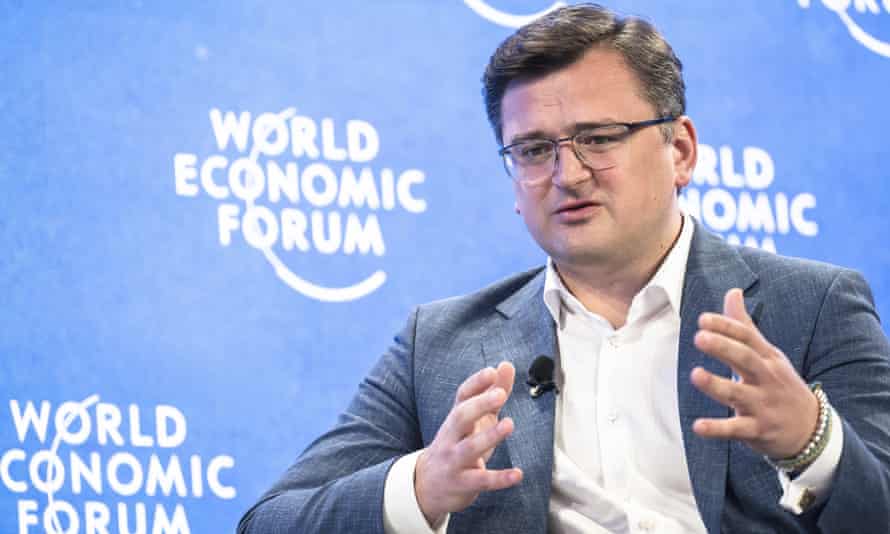
He said that at the beginning of Russia’s war in Ukraine, “there was a public sentiment that Nato was the strong force and the EU was only capable of expressing various different levels of concern”, adding:
But war is always a test that takes the masks off.
Kuleba praised Brussels for its “revolutionary, groundbreaking decisions, which even they themselves did not expect to make”, and accepted that some Nato allies “are helping us”.
He also dismissed Moscow’s claim that it was ready to provide a humanitarian corridor for ships carrying food to leave Ukraine, in return for the lifting of some sanctions.
He told the audience at Davos:
You could not find a better example of a blackmail in international relations.
If anyone is buying it, I think there is a problem with that person, and we shouldn’t waste too much time trying to understand why that person is making that point.
The Russian parliament scrapped the upper age limit for contractual service in the military on Wednesday, highlighting the need to replace lost troops, Reuters reports.
In a video address, Ukraine president Volodymyr Zelenskiy, commenting on the new Russian enlistment rules, said: “(They) no longer have enough young men, but they still have the will to fight. It will still take time to crush this will.”
Police in Lysychansk are collecting bodies of people killed in order to bury them in mass graves, Luhansk regional governor Serhiy Gaidai said.
Some 150 people have been buried in a mass grave in one Lysychansk district, he added, Reuters reports. Oleksiy Arestovych, an adviser to Ukraine’s president, said Russia’s “army is having some tactical success which is threatening to become an operational success in the direction of Lysychansk and Sievierodonetsk”.
An increasing number of former global leaders are pushing for an International Anti-Corruption Court, a decade-old idea that has resurfaced more recently in response to the invasion.
A declaration signed by 42 former prime ministers and presidents from around the world and more than 250 figures from 75 countries, signified mounting anger over financial sources of the conflict, the Washington Post reports:
“Corruption among public officials isn’t just a financial problem; it also undermines democracy and the rule of law in a country and exacerbates inequality among its people,” Dutch minister of foreign affairs Wopke Hoekstra said at a meeting of European Union foreign ministers in April.
But Hoekstra also emphasized that the Netherlands, which houses the International Criminal Court in The Hague, could only establish an anti-corruption court with the support of many other nations – a level of support that is far from assured.”
American leaders have not signed on, and the US is considered a hotbed of international corruption.
It is now nearly midnight in Kyiv. I am Gabrielle Canon, here to take you through the latest updates.
Prince Charles spent time in Romania at a Ukrainian refugee center, BBC reports, visiting civilians who have fled the violence. The visit in Bucharest is the first from a senior royal in the region.
Romania has welcomed nearly a million Ukrainians, and tens of thousands continue to cross into the country. Roughly 6 million people have left Ukraine since the start of the invasion.
Prince Charles, who has been vocal about the war calling it a “brutal aggression,” met with families at the center that also provided resources for refugees as they navigate through transitions into a new country.
A senior United Nations official is due to visit Moscow in the coming days to discuss reviving fertilizer exports, Russia’s UN ambassador Vassily Nebenzia said, stressing that the talks were not linked to a resumption of Ukrainian grain shipments, Reuters reported.
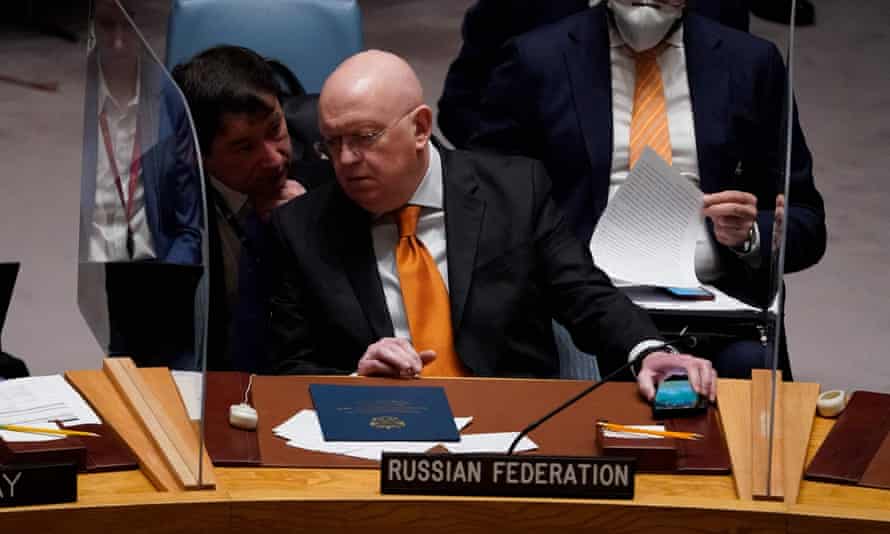
Since Russia invaded neighbouring Ukraine on 24 February, Ukrainian grain shipments from its Black Sea ports have stalled and more than 20m tonnes of grain are stuck in silos, while Moscow says the chilling effect of western sanctions imposed on Russia over the war have disrupted its fertilizer and grain exports.
The conflict is fueling a global food crisis with prices for grains, cooking oils, fuel and fertilizer soaring. Russia and Ukraine account for nearly a third of global wheat supplies, while Russia is also a key global fertilizer exporter and Ukraine is a major exporter of corn and sunflower oil.
Nebenzia said:
Formally, fertilizers and grain are not under sanctions, but there are logistical, transport, insurance, bank transfer problems [created by western sanctions that] prevent us from exporting freely.
“We are prepared to export fertilizers and grain from our ports to the world market … I think that should be negotiated with the Ukrainians, not with Russians.”
However, western officials say any deal on access to Ukrainian ports would need Russian agreement, citing what they say is a Russian blockade and a need for security guarantees.
UN secretary-general António Guterres, who visited Moscow and Kyiv last month, is in “intense contact” with Russia, Ukraine, Turkey, the United States and the European Union in a bid to broker what he calls a “package deal” to resume both Ukrainian food exports and Russian food and fertilizer exports.
Nebenzia said that top UN trade and development official Rebecca Grynspan was due to discuss Russian exports during a visit to Moscow in the coming days.
She is coordinator of the UN Global Crisis Response Group on Food, Energy and Finance that aims to combat global economic shocks from the Ukraine war. Nebenzia also said he believed UN aid chief Martin Griffiths was due to visit Moscow sometime in early June.
UN spokesperson Stephane Dujarric declined to comment.
Russian forces are advancing in the Luhansk part of the Donbas and it’s grim for many places in that province.
Fighting has reached the ‘outskirts’ of the key eastern Ukrainian city of Severodonetsk, AKA Sievierodonetsk, in the region, which had a pre-war population of 100,000, according to AFP.
Here are some of the latest news images coming out of a funeral held in Kyiv after Ukrainian troops were lost in the Donbas.
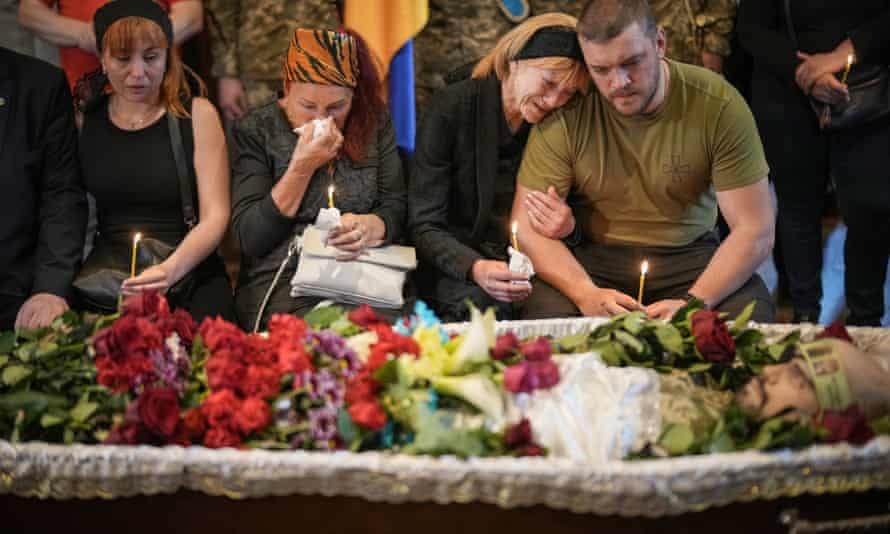
The Ukrainian flag on a casket.
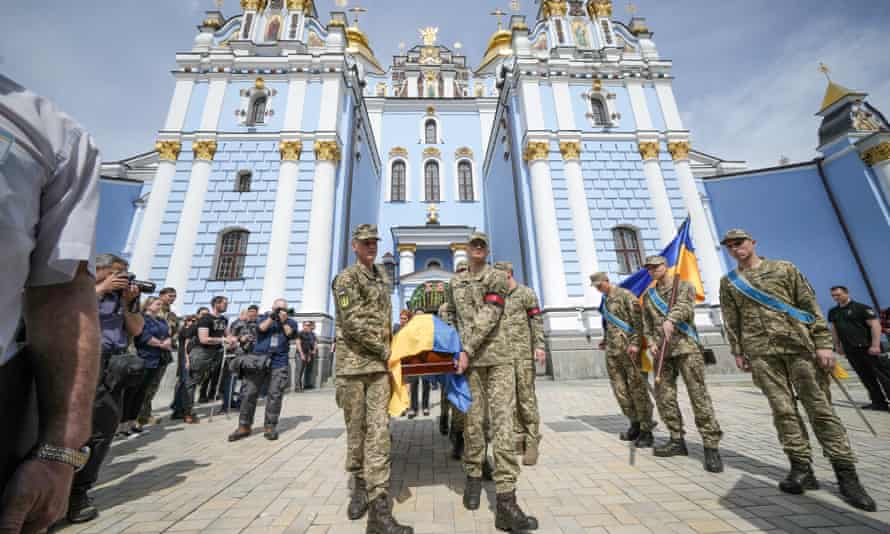
The Associated Press and the PBS series “Frontline” have independently verified that Russia has destroyed or damaged at least 56 Ukrainian schools in a manner that indicates a possible war crime, the Associated Press reports.
The Ukrainian government says Russia has shelled more than 1,000 schools, destroying 95. The accounting likely represents just a fraction of potential war crimes committed during the conflict and the list is updated daily.
A geography teacher, Elena Kudrik, lay dead on the floor of School 50 in the eastern Ukrainian town of Gorlovka. Amid the wreckage surrounding her were books and papers, smeared in blood.
In the corner, another lifeless body of Elena Ivanova, the assistant headmaster slumped over in an office chair, a gaping wound torn into her side.
“It’s a tragedy for us … It’s a tragedy for the children,” said school director Sergey But, standing outside the brick building shortly after the attack.
A few kilometers away, at the Sonechko pre-school in the city of Okhtyrka, a cluster bomb destroyed a kindergarten, killing a child. Outside the entrance, two more bodies lay in pools of blood.
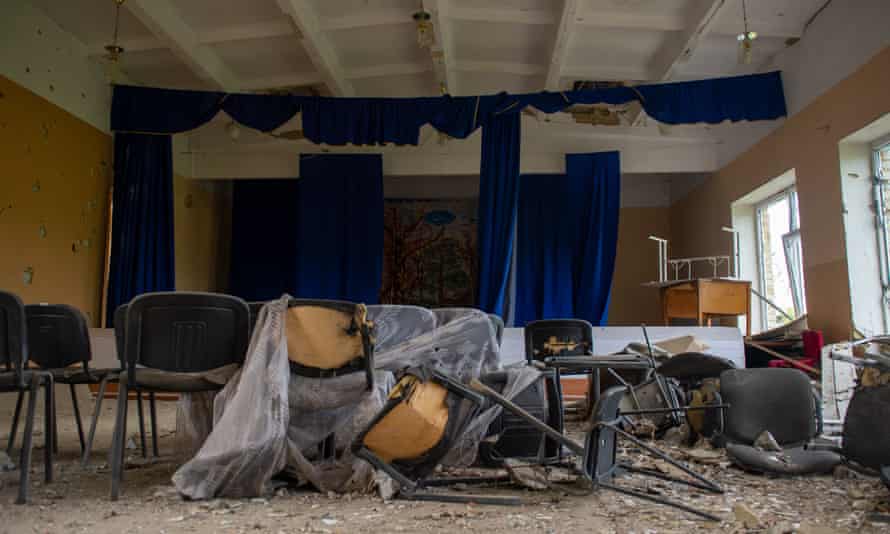
Despite the widespread damage and destruction to educational infrastructure, war crimes experts say proving an attacking military’s intent to target individual schools is difficult.
Russian officials deny targeting civilian structures, and local media reports in Russian-held Gorlovka alleged Ukrainian forces trying to recapture the area were to blame for the blast that killed the two teachers there. But the effects of the destruction are indisputable.
Unicef communications director Toby Fricker, who is currently in Ukraine, agreed.
“School is often the heart of the community in many places, and that is so central to everyday life.”
As the war grinds on, millions of kids are continuing to go to school online. The international aid group Save the Children said it is working with the government to establish remote learning programs for students at 50 schools. Unicef is also trying to help with online instruction.
“Educating every child is essential to preventing grave violations of their rights,” the group said in a statement to the AP.
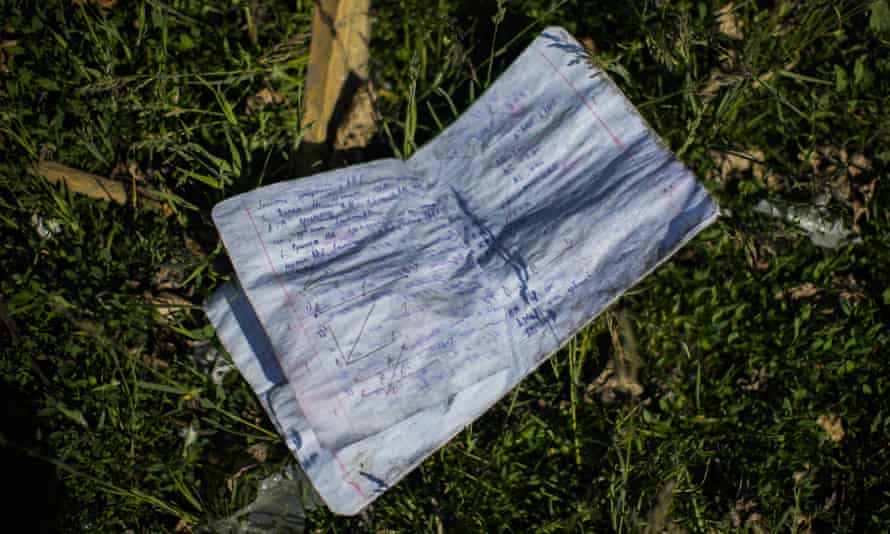
Turkey threatens to stall Nato process if Nordic nations fail to act.
Turkey on Wednesday said the Nato accession process for Sweden and Finland would not move forward unless they addressed Ankara’s security concerns, in talks with delegations from both Nordic states, Agence France-Presse writes.
We conveyed our message in very clear terms that the process will not move forward unless Turkey’s security concerns are addressed through concrete steps and within a certain timetable,” presidential spokesman Ibrahim Kalin told reporters after meeting Swedish and Finnish representatives in the capital Ankara.
Nato member Turkey has opposed the applications of Sweden and neighbouring Finland over what it considers leniency toward Kurdish militant groups.
Stockholm and Helsinki submitted their bids to join the US-led defense alliance last week, reversing decades of military non-alignment, after political and public support for membership soared following Russia’s invasion of Ukraine.
But Turkey is throwing a spanner in the works as any membership must be unanimously approved by all Nato members.
Ankara accuses Stockholm in particular of providing safe haven for the outlawed Kurdistan Workers’ party (PKK), listed as a terror group by Turkey and its western allies.
They told us they understand Turkey’s security concerns, but we’ll see what steps they will take,” Kalin said, adding that dialogue would continue.
Sweden has imposed embargoes on arms sales to Turkey since 2019 over Ankara’s military offensive in Syria.
Kalin said on Wednesday he was seeing a “positive” attitude on the removal of sanctions in the defense industry.
We don’t think it is appropriate for allies to impose sanctions on each other, that would weaken the alliance and make enemies happy,” he added.
Summary
It is 9pm in Kyiv. Here’s where we stand:
- Russia’s foreign ministry spokesperson, Maria Zakharova, said an Italian peace plan for Ukraine was a “fantasy”. Zakharova said at her weekly briefing: “You can’t supply Ukraine with weapons with one hand and come up with plans for a peaceful resolution of the situation with the other.”
- Sweden is “obviously” not funding or arming terrorist organisations, its prime minister, Magdalena Andersson, said, in response to Turkish claims that it is a hotbed for terrorist groups. Her remarks came as Finnish and Swedish delegations began talks with Ankara today, which Andersson said would provide an opportunity to clear up what she said was “confusion” circulating about Swedish support for different groups.
That’s it from me, Léonie Chao-Fong, today as I hand the blog to my colleague, Joanna Walters. I’ll be back tomorrow, thank you.
Drone footage has illustrated the damage of a missile attack on a train facility in Pokrovsk, in the Donetsk region.
The video shows the aftermath of the strike, which wrecked buildings and infrastructure. It comes as Ukrainian officials said Russian forces have increased their assault on two key towns in the Donbas region.
Nato ‘doing literally nothing’ to stop Russia, says Ukraine
Ukraine’s foreign minister, Dmytro Kuleba, accused Nato of “doing literally nothing” in the face of Russia’s invasion of his country.
Kuleba praised the EU for its “revolutionary” decisions to back Kyiv but said the Nato military alliance had been “completely sidelined”.
Speaking at the World Economic Forum in Davos, Kuleba said:
Nato as an alliance, as an institution, is completely sidelined and doing literally nothing. I’m sorry to say it.

He said that at the beginning of Russia’s war in Ukraine, “there was a public sentiment that Nato was the strong force and the EU was only capable of expressing various different levels of concern”, adding:
But war is always a test that takes the masks off.
Kuleba praised Brussels for its “revolutionary, groundbreaking decisions, which even they themselves did not expect to make”, and accepted that some Nato allies “are helping us”.
He also dismissed Moscow’s claim that it was ready to provide a humanitarian corridor for ships carrying food to leave Ukraine, in return for the lifting of some sanctions.
He told the audience at Davos:
You could not find a better example of a blackmail in international relations.
If anyone is buying it, I think there is a problem with that person, and we shouldn’t waste too much time trying to understand why that person is making that point.

Patrick Wintour
Germany’s chancellor, Olaf Scholz, said victory for Ukraine “does not seem to be an option” and that Berlin is “waiting for Putin to say his war goals are reached”.
Der Spiegel after a plane brief with Scholz on his war goals.”Victory for Ukraine does not seem to be an option. The strategy could be called active waiting. The Germans are cautiously supplying arms, participating in boycotts & waiting for Putin to say his war goals are reached”
— Patrick Wintour (@patrickwintour) May 25, 2022

